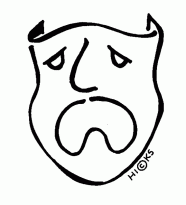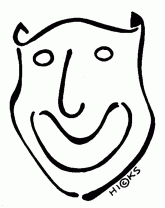The Writing Workshop

Now that you have had a GREAT discussion with Aristotle, I think you are prepared to start writing your own plays. Who knows, maybe yours will even be the next Oedipus! Are you ready to get started? Do you have your ink? Or for those of you who packed something more modern, your pen? Good. Then let's begin.
The first step in writing a Tragedy or a Comedy, is deciding whether you want your audience to be happy or not. Be thinking about that. I want my audience to be happy in the end, so I will be writing a Tragedy.
Don't look so shocked! Tragedies show humans doing great things, overcoming obstacles because they are human! At the end of a Tragedy, (like Oedipus the King) we should feel great that even though there are horrible things that happen in life (like killing our father and marrying our mother) we can overcome!
If you were thinking you wanted to make your audience sad, then Comedy is the thing for you! Comedies make fun of humans and make us look bad... really bad. At the end of a comedy, you should come away thinking, "Wow, I really feel sad to be part of the human race." (And just so you know, if you write a sad play and have it end happy, this is considered a comedy too.) Who would have thought that those of you who have happy endings are really living in a comedy.
Once you have decided WHAT you want to get to your audience, then you need character, plot, etc. You remember our discussion with Aristotle, right? Let's begin.
The first step in writing a Tragedy or a Comedy, is deciding whether you want your audience to be happy or not. Be thinking about that. I want my audience to be happy in the end, so I will be writing a Tragedy.
Don't look so shocked! Tragedies show humans doing great things, overcoming obstacles because they are human! At the end of a Tragedy, (like Oedipus the King) we should feel great that even though there are horrible things that happen in life (like killing our father and marrying our mother) we can overcome!
If you were thinking you wanted to make your audience sad, then Comedy is the thing for you! Comedies make fun of humans and make us look bad... really bad. At the end of a comedy, you should come away thinking, "Wow, I really feel sad to be part of the human race." (And just so you know, if you write a sad play and have it end happy, this is considered a comedy too.) Who would have thought that those of you who have happy endings are really living in a comedy.
Once you have decided WHAT you want to get to your audience, then you need character, plot, etc. You remember our discussion with Aristotle, right? Let's begin.
Still struggling? Ok, let's explore a little more background. Maybe that will get your creative juices flowing. For those of you already writing, carry on! I expect to read great things from all of you!
Tragedy

The three best Tragedy writers in Greece during this time were Aeschylus, Sophocles, and Euripides. First you are going to need to come up with a tragic hero. Oedipus is an example of this. In Grecian times, this person was a royal figure. This person needs to have a character flaw that will ultimately be his demise. Pride is a common tragic flaw. But you can come up with whatever (Just make sure it isn't something like, too happy. That isn't tragic at all.)
Then, decide what you want your audience to feel bad about. If you want them to be upset about their excessive pride, for example, you will need to have your tragic hero suffer from this flaw.
Greek Tragedy also has a chorus: a group of men who recite the lines together. They sing and dance and are vital to Greek Tragedy. There were 15 men in the chorus. At the beginning of Greek theater, they were very important in the telling of the story. By the end, however, they had lost their importance. The chorus often represented the common people in the play, giving exposition and feelings and describing things that take place off-stage. Whether you want to include a chorus or not is up to you.
Make sure you leave your audience feeling pity for the suffering tragic hero. How can they learn what you are telling them unless they feel it deep inside?
Remember, Tragedies are supposed to make you audience feel like humans are good. You want to make them happy to be part of the human race. There are no happily ever after in these shows, we want pain. You've heard the saying, "It hurts so good," right?
Still need help? Go visit Aristotle again or our Shakespearean writing class.
Then, decide what you want your audience to feel bad about. If you want them to be upset about their excessive pride, for example, you will need to have your tragic hero suffer from this flaw.
Greek Tragedy also has a chorus: a group of men who recite the lines together. They sing and dance and are vital to Greek Tragedy. There were 15 men in the chorus. At the beginning of Greek theater, they were very important in the telling of the story. By the end, however, they had lost their importance. The chorus often represented the common people in the play, giving exposition and feelings and describing things that take place off-stage. Whether you want to include a chorus or not is up to you.
Make sure you leave your audience feeling pity for the suffering tragic hero. How can they learn what you are telling them unless they feel it deep inside?
Remember, Tragedies are supposed to make you audience feel like humans are good. You want to make them happy to be part of the human race. There are no happily ever after in these shows, we want pain. You've heard the saying, "It hurts so good," right?
Still need help? Go visit Aristotle again or our Shakespearean writing class.
Comedy

There are three different kinds of Comedy plays. I know, I know, I am making it harder to choose what to write on. But I have to tell you. First, there is the Satyr play. This is a play that is filled with satyrs (half goat men) and parodied mythology. If you want to do something with Greek Myths, then this is the comedy for you. Secondly, there is the Old Comedy. This is makes fun of Greek politics, people, society, etc. You have spent a lot of time here in Greece, maybe this is the comedy for you! Finally, there is the New Comedy. This is a comedy of manners.
Old Comedies were set up like the tragedies, with a chorus and such. So Old Comedies can be called Funny Tragedy. They also had prologues, like Tragedy and unique episodes that Tragedy has, like debates between two opposing forces.
Satyr poked fun at honored Greek institutions, through mythology. If you don't know a lot about Mythology, this is going to be hard for you to write. There is only one Satyr that is still around in 2010: Cyclops.
New Comedy is not a satyr or extreme exaggeration. It is a more subtle plot with pretenses and everyday situations. It is also generally a romance "boy gets girl, boy loses girl, boy get's girl." There are comedies like this in modern day theater. These plays are generally written in five acts. Another important addition (or rather deletion) to New Comedy is the reduction of the chorus. Now the chorus is only there to sing and dance between scenes.
Does a comedy sound like the play for you? Remember, a comedy is supposed to make humans look bad. If funny is what you want, then sadness is what you get. Comedies are a sad, sad thing.
Old Comedies were set up like the tragedies, with a chorus and such. So Old Comedies can be called Funny Tragedy. They also had prologues, like Tragedy and unique episodes that Tragedy has, like debates between two opposing forces.
Satyr poked fun at honored Greek institutions, through mythology. If you don't know a lot about Mythology, this is going to be hard for you to write. There is only one Satyr that is still around in 2010: Cyclops.
New Comedy is not a satyr or extreme exaggeration. It is a more subtle plot with pretenses and everyday situations. It is also generally a romance "boy gets girl, boy loses girl, boy get's girl." There are comedies like this in modern day theater. These plays are generally written in five acts. Another important addition (or rather deletion) to New Comedy is the reduction of the chorus. Now the chorus is only there to sing and dance between scenes.
Does a comedy sound like the play for you? Remember, a comedy is supposed to make humans look bad. If funny is what you want, then sadness is what you get. Comedies are a sad, sad thing.
